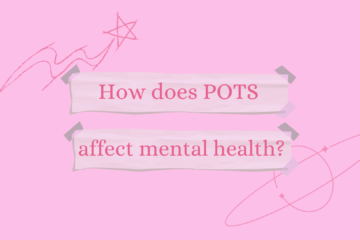Trigger warning: talk of pregnancy complications and loss
There have been very few studies on how pregnancy and POTS affect each other, even though around eighty percent of POTS patients can get pregnant.
One of the only places I could find information about pregnancy and POTS was the National Library of Medicine. They reported that it is possible to have a pregnancy with POTS, the pregnancy just has to be much more closely monitored than with someone who doesn’t have any disabilities. With that said, potsies with co-occurring conditions, especially Ehlers Danlos Sundrome (EDS), are at a higher risk of having an unhealthy pregnancy.
Preterm birth is much higher in those that experience at least one syncopal event during pregnancy. Even just one faint during pregnancy can increase the risk of pre-term birth, low birth weight, and congenital abnormalities, with the first trimester being the most dangerous time to experience syncope. Congenital abnormalities are significantly higher for children who experienced multiple syncopal events as opposed to just one.
It is very common for symptoms to increase during and after pregnancy as there are significant changes in the maternal cardiovascular physiology like an increase in maternal blood volume, increase in maternal cardiac output, reduction in maternal blood pressure, and increase in maternal heart rate. Early utilization of epidural anesthesia with IV or Lactated Ringer’s solution hydration prior is recommended to decrease the chance of tachycardia and hemodynamic instability due to the pain experienced during labor and child birth. Natural births without pain control and home births are not recommended. Vaginal deliveries appear to be the safest option for potsies and is the preferred mode of delivery, but the delivery should always be determined by the obstetric and surgical considerations.
Dysautonomia International, University of Calgary, and Vanderbilt University did a study with 8941 female patients diagnosed with POTS, the largest study to date about POTS symptoms through out pregnancy. They concluded a few things. They said that most potsies reported experiencing worsening symptoms primarily in the 1st trimester (62.6%), followed by the 3rd trimester (58.9%) and the 3 months after pregnancy (58.7%) being the next worse phases of pregnancy for symptoms. They found that how your symptoms act in the first trimester can help you predict your symptoms for the rest of the pregnancy. Some potsies symptoms felt better at the start of their pregnancy and continued to improve through out the pregnancy, while other has worsening symptoms in the beginning of the pregnancy and continued to get worse.
The study concluded that patients with POTS and EDS produced fewer live births and more pregnancy losses than those with just POTS and no EDS, and those with POTS and EDS reported more worsened symptoms after pregnancy. In general, at least one pregnancy loss was reported by 44.2% of participants who had been pregnant, with those who have co-occurring conditions reporting more losses.
With the uncertainty of reproductive freedoms in the United States today, I have also done a little research on what birth controls are best for potsies who don’t currently want to get pregnant, especially for long term protection. The answer isn’t perfectly clear, so I am asking my doctors next week what their recommendations are and I will update this post later with what they say. My personal research has found that progestin only meathods are generally safer for those with high blood pressure or fluctuating blood pressure. This includes the minipill, the birth control implant, and the hormonal IUD. Progestin only birth control methods are at a lower risk of blood clots than the combination pills that contain estrogen. Help with bleeding or skipping your period all together can be very beneficial for potsies who have significantly worsened symptoms during menstration. I made a post talking about how menstruation impacts POTS on all of my socials a couple weeks ago if you want to learn more.
Be sure to subscribe to my emails and follow my socials to stay up to day with all things Power in POTS! < 3
Also check out my latest blogs “How does POTS affect mental health?”, “Dysautonomia/POTS Organizations“, and “A list of some common co-occurring conditions to POTS”.



0 Comments